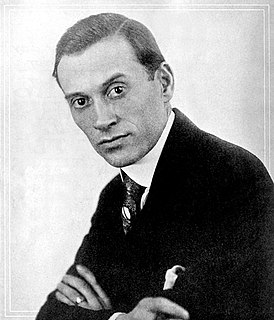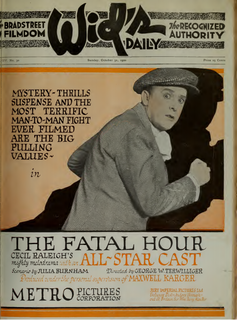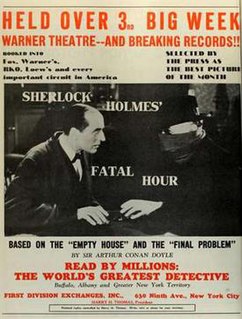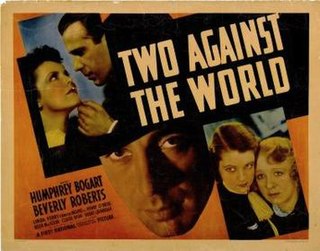This page is based on this
Wikipedia article Text is available under the
CC BY-SA 4.0 license; additional terms may apply.
Images, videos and audio are available under their respective licenses.
The year 1920 in film involved some significant events.

Alfred Edward Woodley Mason was an English author and politician. He is best remembered for his 1902 novel of courage and cowardice in wartime, The Four Feathers and is also known as the creator of Inspector Hanaud, a French detective who was an early template for Agatha Christie's famous Hercule Poirot.

Rowland Vance Lee was an American film director, actor writer, and producer.

The Fatal Hour is a 1940 American thriller crime drama film directed by William Nigh. It starred Boris Karloff, Grant Withers, and Marjorie Reynolds.

William Nigh was an American film director, writer, and actor. His film work sometimes lists him as either "Will Nigh" or "William Nye".
Anthony O'Sullivan was an American silent film actor and director. He appeared in 163 films between 1906 and 1918. He also directed 35 films between 1913 and 1915. He died in The Bronx, New York

George Terwilliger was an American film director and screenwriter of silent and early sound-era films. He directed 76 films between 1912 and 1936. He also wrote 54 films between 1910 and 1939. He died in Hialeah, Florida.
The Fatal Sign is a 1920 American drama film serial directed by Stuart Paton. It is considered to be a lost film.
The Face at the Window is a melodramatic detective play written by F. Brooke Warren and first produced in 1897.
Cecil Raleigh was an English actor and playwright.
The Fordington Twins is a 1920 British silent drama film directed by W.P. Kellino and starring Dallas Anderson, Mary Brough and Nita Russell. It is based on a novel by Edgar Newton Bungay. Two young brothers who live over a fishmongers in Bethnal Green inherit a large sum of money and a country estate, but are almost cheated out of it by a swindler.
The Ideal Film Company was a British film production and distribution company that operated between 1911 and 1934.

The Fatal Witness is a 1945 American mystery film directed by Lesley Selander and written by Jerry Sackheim and Cleve F. Adams. The film stars Evelyn Ankers, Richard Fraser, George Leigh, Barbara Everest, Barry Bernard and Frederick Worlock. The film was released on September 15, 1945, by Republic Pictures.
Astra Films was a British film production and distribution company of the silent era. It was set up in Leeds following the First World War by the film director Herbert Wilcox, his younger brother Charles Wilcox and H.W. Thompson, a leading figure in film distribution in the North of England. After the company's initial success, Wilcox left the firm to set up on his own and rose to become one of the most successful independent producer-directors in the world. After a merger the company released films under the name Astra-National.
The Fatal Hour is a 1937 British drama film directed by George Pearson and starring Edward Rigby, Moira Reed and Moore Marriott. It was the final film of the director George Pearson, who had been a leading figure during the silent era, and was made at Pinewood Studios.
Fun With the Bridal Party was a 1908 French silent comedy film directed by Georges Méliès.

A Gipsy Cavalier is a 1922 British historical drama film directed by J. Stuart Blackton and starring Georges Carpentier, Flora le Breton and Rex McDougall. It was one of three films made in Britain during the early 1920s by the British-born American founder of Vitagraph Studios. All involved elaborate sets, costumes and extras and set an example of showmanship to emerging British filmmakers. It was adapted from the novel My Lady April by John Overton.










